 Violette
Violette
Starring Emmanuelle Devos, Sandrine Kiberlain, Olivier Gourmet, Catherine Hiegel, and Jacques Bonnaffé
Directed by Martin Provost
Rated NR
Run Time: 138 minutes
Genre: Drama/Biography
Opens June 27th
By Eric Forthun of Cinematic Shadows
Violette, a biopic about the French feminist writer Violette Leduc, opens with the title character discussing beauty’s importance to women and her fundamental disagreement with that notion. It’s an effective introduction to a forward-thinking woman in a society that devalues women and their opinions. The film is divided into six distinct parts, each defined by the characters that interact and matter to the protagonist; most biopics would focus on big events, but Martin Provost’s film emphasizes the emotions surrounding the central figure and her increasing loneliness. Her solitude allows her to write honestly and without a filter, a rarity in that day, and her topics lead into compelling arguments surrounding female rights’ issues in today’s world. Abortion and bastardizing children are two heavy concepts embraced as important to understanding feminism and its emergence during that time, illustrating the necessity of this story both in its time frame and the socially evolved, modern world.
Violette Leduc (Emmanuelle Devos) is introduced through her tumultuous relationships, most immediately with her passionless lover. He leaves her to head to Germany to support the war effort as Violette finds her world growing more difficult to sustain. She needs to work but doesn’t know what occupation to take; her partner was a writer who never seemed to write about her, so she uses that creative fuel to try writing herself. When she finishes her book, she tracks down a local feminist writer, Simone de Beauvoir (Sandrine Kiberlain), to present her work. Simone likes the book because of its honesty and recognizes that Violette has the potential to write about things never mentioned before in French culture. They aim to work together on helping each others’ works and providing the country with a new wave of female writing that handles sexuality and love from an innovative perspective.
The film explores Violette’s lesbian affairs and her desire to find love despite her propensity to fall in love quickly and passionately. The first twenty minutes of the narrative are driven by loud outbursts from characters and rooted heavily in characters that we are not familiar with; it sets up a story that feels more empty than it becomes. There’s a grating nature to the manner in which Provost presents those moments, as if the film can only drive forward with characters exchanging abrasive moments of emotional realization. But the majority of the film’s 138 minutes revolves around the quiet, methodical nature of its protagonist and her colleagues. There’s an understated nature to almost every scene after those numbing opening moments, a sign that the characters become properly defined and the performances work in accordance with each other.
Devos is marvelous in the title role, allowing Leduc to transform into an emotionally sheltered woman that hopes to find truths about herself within her works. The film is a character study above all else, not particularly caring about Leduc’s achievements until the final moments; instead, the narrative is more concerned with the emotional devastation and creative frustration Violette faces. The supporting performances are strong and similarly visceral, with Kiberlain in particular using the subtleties of the script to accentuate the romance underlying every action. Provost and his cinematographer use lush, long takes to let the actions speak for themselves, and they provide mostly naturalistic scenes dependent on outside light and nature. Violette is deliberately quiet and understated throughout, a strikingly beautiful feature that demonstrates how the most impassioned, important creativity can come from pain.









